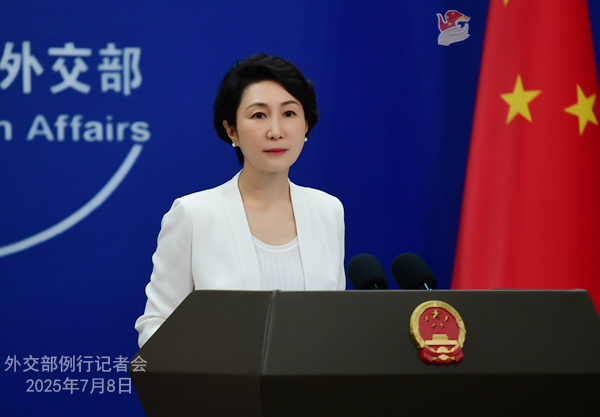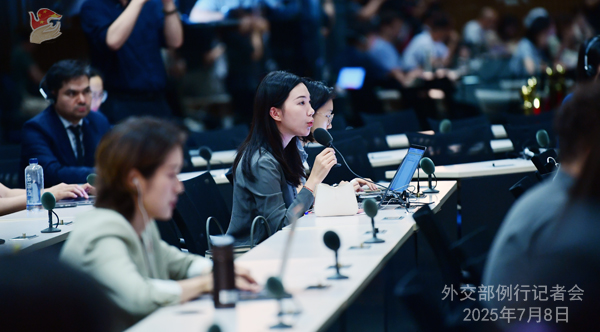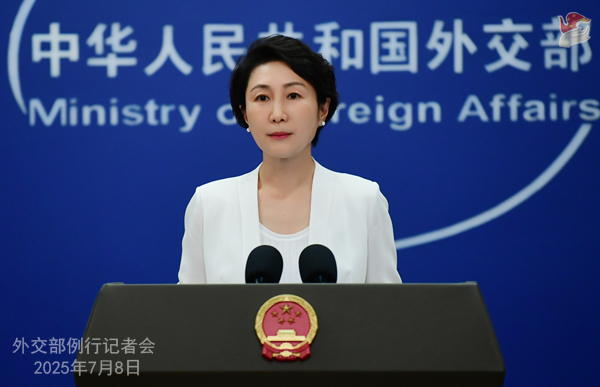
People’s Republic of China


At the invitation of Premier of the State Council Li Qiang, Australian Prime Minister Anthony Albanese will pay an official visit to China from July 12 to 18.
From July 10 to 11, Member of the Political Bureau of the CPC Central Committee and Foreign Minister Wang Yi will attend the China-ASEAN Foreign Ministers’ Meeting, the ASEAN Plus Three Foreign Ministers’ Meeting, the East Asia Summit Foreign Ministers’ Meeting and the ASEAN Regional Forum Foreign Ministers’ Meeting in Kuala Lumpur, Malaysia.
Xinhua News Agency: Premier Li Qiang attended the 17th BRICS Summit in Rio de Janeiro, Brazil. Could you share more details? In the current complex and severe international landscape with rising unilateralism and protectionism in particular, how does China view the meaning and prospects of BRICS cooperation?
Mao Ning: From July 6 to 7, Premier of the State Council Li Qiang attended the 17th BRICS Summit in Rio de Janeiro, Brazil. He pointed out that transformations unseen in a century are accelerating in the world, international rules and order face serious challenges, and the authority and efficacy of multilateral mechanisms are weakening. The global governance vision of extensive consultation and joint contribution for shared benefit proposed by President Xi Jinping holds even greater value and relevance. All parties need the spirit of equality and respect to enable more extensive consultation, united and collaborative actions to enhance our joint contribution, and wholehearted embrace of other’s success as our own to expand shared benefits. Standing at the forefront of the Global South, BRICS countries should uphold independence and strive to be the pioneering force in advancing global governance reform, uphold justice and safeguard world peace and tranquility, focus on development and bolster the driving forces of economic growth, and uphold inclusiveness and promote exchange and mutual learning among civilizations. Greater BRICS cooperation should safeguard and practice multilateralism. It should be committed to building an open world economy, enhancing international financial cooperation and unlocking new, promising areas in economic growth. It should unequivocally oppose unilateralism and protectionism, and keep the industrial and supply chains stable and smooth.
The meeting adopted the Rio de Janeiro Declaration, the Statement on Global Governance of Artificial Intelligence and the Climate Finance Framework Declaration.
China will take this meeting as an opportunity to continue to uphold the BRICS spirit, work hand in hand with BRICS partners to promote our shared values, safeguard our common interests and facilitate solidarity-driven collective advancement, make global governance more just, equitable, effective and orderly, and join hands in building a better world shared by all.
Beijing Youth Daily: On Prime Minister Albanese’s visit to China, could you brief us on the background and China’s expectation for the visit?
Mao Ning: This visit is taking place just as the China-Australia comprehensive strategic partnership enters its second decade. Under the guidance of the leaders and the joint efforts of the two countries, China-Australia relations have continued to improve and grow. China hopes that through this visit, the two sides will strengthen communication, enhance mutual trust, expand practical cooperation, and further advance the comprehensive strategic partnership.

CCTV: On Foreign Minister Wang Yi’s attendance at the upcoming ASEAN Plus Foreign Ministers’ Meetings, how does China view the current state of East Asian cooperation and what’s China’s expectation for those meetings?
Mao Ning: In recent years, East Asian cooperation has generally maintained the momentum of steady advancement. Countries in this region have engaged in cooperation on the basis of equality, mutual respect, mutual benefit, and openness and inclusiveness. This has enabled development progress, facilitated regional integration, and benefited local communities. In the meantime, the international landscape is experiencing more instability and rapid change, as well as rising unilateralism and protectionism. They pose unprecedented challenges to East Asian cooperation.
China hopes that through the upcoming foreign ministers’ meetings, parties will be able to build more consensus, focus on development and cooperation, and prepare the ground for the leaders’ meetings later this year. China firmly upholds ASEAN centrality, stands ready to steadily advance the China-ASEAN Free Trade Area 3.0 upgrade, and foster an even closer China-ASEAN community with a shared future. China looks forward to working with regional countries to uphold true multilateralism and open regionalism and defend free trade and the multilateral trading system, to implement RCEP with high quality and expand cooperation in emerging industries, to promote the Asian values of peace, cooperation, openness and inclusiveness, to develop a model of security for Asia featuring security for all, seeking common ground while shelving differences and dialogue and consultation, and to together build a peaceful, safe and secure, prosperous, beautiful and amicable home in Asia.
TVB: On July 5, Marco Rubio, U.S. Secretary of State, released a statement on the website of the Department of State and his social media account to celebrate the 14th Dalai Lama’s 90th birthday and made some remarks on Xizang. What’s China’s comment?
Mao Ning: Xizang affairs are purely China’s internal affairs that brook no interference from any external force. As is widely known, the 14th Dalai Lama is not a pure religious figure, but a political exile engaged in anti-China separatist activities under the cloak of religion. He and the so-called “Tibetan government-in-exile” are in no position at all to represent the people in Xizang, still less decide the future of Xizang.
Under the CPC guidelines for governing Xizang in the new era, Xizang enjoys economic prosperity and social harmony and stability. Its culture and traditions are protected and promoted. Rights and freedoms of people from all ethnic groups, including freedom of religious belief and freedom to use and develop their own spoken and written languages, are fully protected. The world can clearly see that, and the U.S. is in no position to point its fingers at China. We urge the U.S. to be fully cognizant of the importance and sensitivity of Xizang-related issues, see clearly the anti-China separatist nature of the Dalai group, honor the commitments the U.S. has made to China on issues related to Xizang, stop meddling in those issues, and stop sending any wrong signal in any form to the “Tibet independence” forces.
Bloomberg: Marco Rubio is also heading to Kuala Lumpur for the ASEAN meeting. Are there plans for Wang Yi and Rubio to meet?
Mao Ning: I have no information to offer on that.
Bloomberg: President Donald Trump issued letters again threatening key trading partners with high tariffs, although he delayed increasing those duties until August 1. Would the Ministry like to comment on this broad tariff action by Trump? Do you have any update on the status of trade talks between China and the U.S.?
Mao Ning: China’s position on tariffs is consistent and clear. There are no winners in a trade war or tariff war. Protectionism hurts everyone’s interests. On China-U.S. trade talks, I’d refer you to competent authorities.
Bloomberg: Treasury Secretary Scott Bessent said that he expected to meet his Chinese counterpart in the coming weeks to advance discussions on trade and other issues. Would the Ministry like to comment on that?
Mao Ning: I’d refer you to competent authorities.




